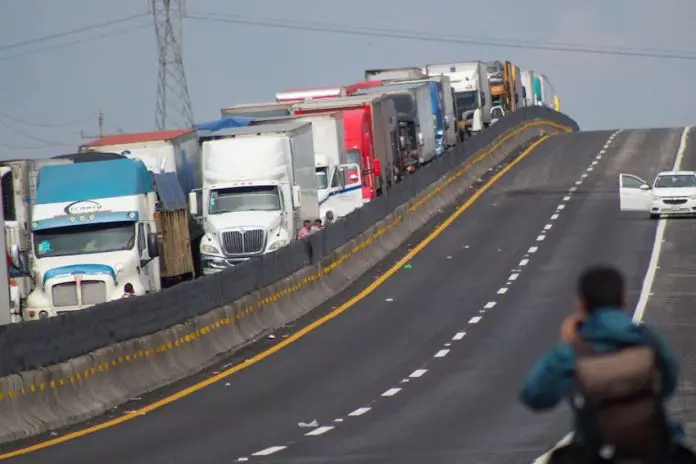Protesters blockading the Mexico City-Puebla highway and a road that connects to it halted more than 100,000 tractor-trailers and caused economic losses of over 10 billion pesos (US $531 million), according to business groups.
Some 200 residents of the municipality of Santa Rita Tlahuapan, Puebla, commenced a blockade of the Mexico City-Puebla highway and the Arco Norte toll road on Tuesday.
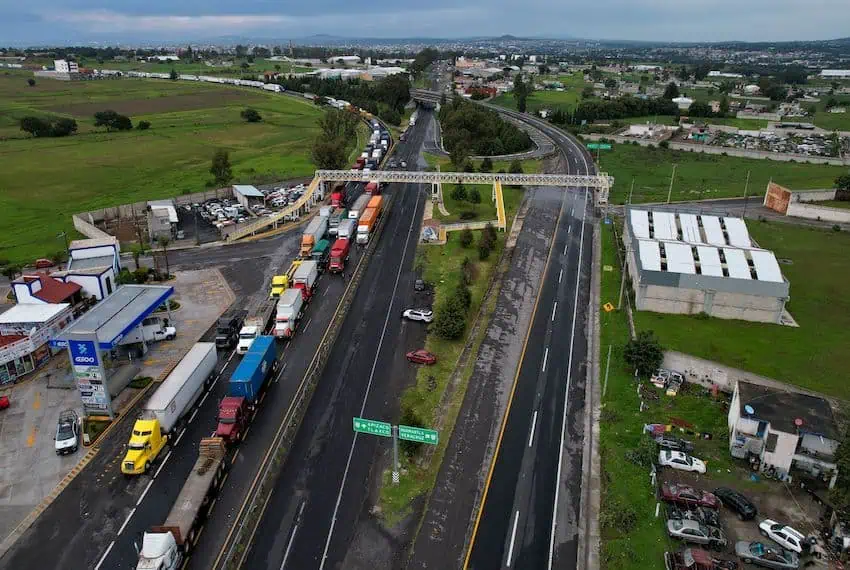
The residents, among whom are ejidatarios, or community landowners, are demanding fair compensation for land that was expropriated for the construction of the Mexico City-Puebla highway, which opened in 1962 and has been expanded in more recent decades.
Their blockade at Kilometer 74 of the highway remained in place on Friday morning, but one lane is now open in both directions.
The Business Coordinating Council (CCE), an umbrella group made up of various business organizations, said in a statement on Thursday that the blockades of the Mexico City-Puebla highway and the Arco Norte road had brought approximately 130,000 freight vehicles to a standstill, “causing economic losses estimated at more than 10 billion pesos.”
It called on federal and state authorities to “urgently” enforce the rule of law and clear the roadblocks.
The blockades are significantly affecting a range of industries including manufacturing, retail and logistics services, the CCE said, describing the sectors as “fundamental for the country’s economy.”
“Any interruption to their operation has repercussions that extend far beyond the blockade points,” it added.
Avanza de manera fluida el tránsito vehicular en la autopista México-Puebla, a pesar de que solo ha sido habilitado un carril en cada sentido de manera permanente 🚗🚙 pic.twitter.com/cJkxzVNVmZ
— El Heraldo de Puebla (@HeraldoPue) August 9, 2024
The CCE, made up of organizations including the Mexican Employers Federation (Coparmex) and the National Agriculture Council, also said that the blockades are affecting the capacity of “thousands of people” to “access essential services, fulfill their work responsibilities and maintain the supply of essential goods.”
“It’s imperative that order is reestablished and that safety and freedom of movement is guaranteed for truckers, workers and all citizens who depend on these roads for their daily activities,” the CCE said.
National trucking association Canacar also cited economic losses of more than 10 billion pesos. Association president Miguel Ángel Martínez told a press conference on Thursday that some products transported by affected freight trucks would be spoiled.
“The trucks have equipment that can cool perishables for 24 hours, which means that they’re already spoiled. … It’s a situation that’s getting more complicated by the minute,” he said.
Martínez said that tractor-trailers could use alternative routes to avoid the blockades, including the Mexico City-Cuernavaca highway, but asserted that those roads don’t have the capacity to accommodate large numbers of trucks. These routes also raise costs because using them increases the distance traveled.
The opening of one lane in both directions on the Mexico City-Puebla highway is not a solution, he said, describing the benefits as “minimal.”
For its part, Coparmex said in a statement that it “understands and respects the historic demands of the Santa Rita Tlahuapan ejidatarios.”
However, “the recurrence of these blockades” not only affects thousands of people, but has “long-term effects on investor confidence and our country’s competitiveness,” the organization said.
“Legal certainty and respect for the law are fundamental for the economic and social development of Mexico,” Coparmex added.
‘We won’t withdraw until we see a signed document’
The newspaper Reforma reported Friday morning that ejidatarios from Tlahuapan were maintaining their protest for a fourth consecutive day.
However, they agreed to leave one lane open in both directions on the Mexico City-Puebla highway “to avoid further impacts on citizens,” Reforma said.
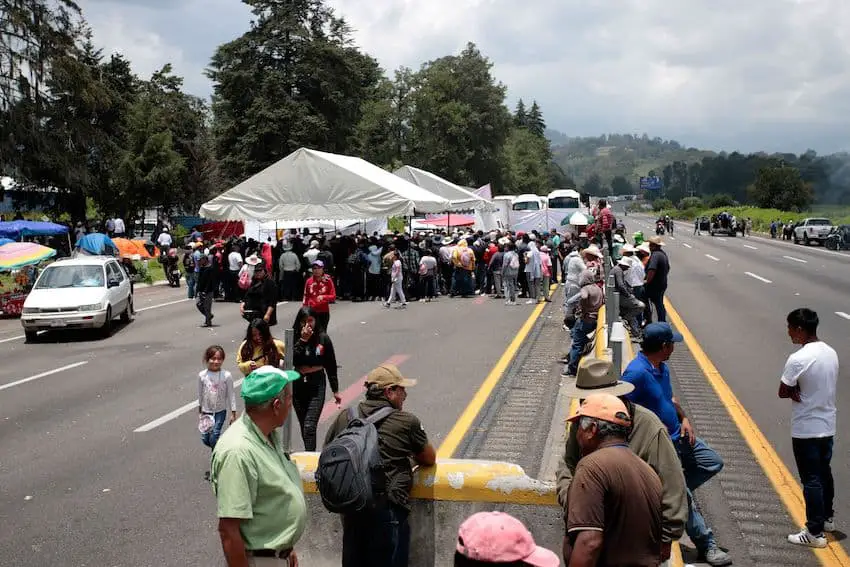
The highway was completely blocked for more than 48 hours before Puebla authorities negotiated the opening of one lane in both directions on Thursday.
Landowners told Reforma they are seeking compensation for 41 hectares of land on the López Rayón ejido that was expropriated for the construction of the highway.
The Associated Press reported that “authorities acknowledge the farmers’ land was taken, and have agreed to pay them, but the two sides cannot agree on how much they are due.”
Reforma reported that ejidatarios discussed the plans for their ongoing protest in a meeting on the side of the highway.
“We’re going to continue,” said one protester. “… We won’t withdraw until we see a signed document.”
Another protester argued that the effectiveness of the blockade had been diminished by the opening up of one lane in both directions.
“What’s the point if cars are now going through? It’s not the same pressure,” he said.
“The truth is I don’t see the same strength, compañeros. Let’s regroup and see how the negotiations go,” said another person.
‘We can’t pay more than an appraisal establishes’
At his morning press conference on Thursday, López Obrador asserted that the protesters are “acting with the bad influence” of “lawyers who want to profit” from their compensation claim.
The protesters are reportedly being advised by a lawyer who won a 176-million-peso payout for other ejidatarios from Santa Rita Tlahuapan in 2018.
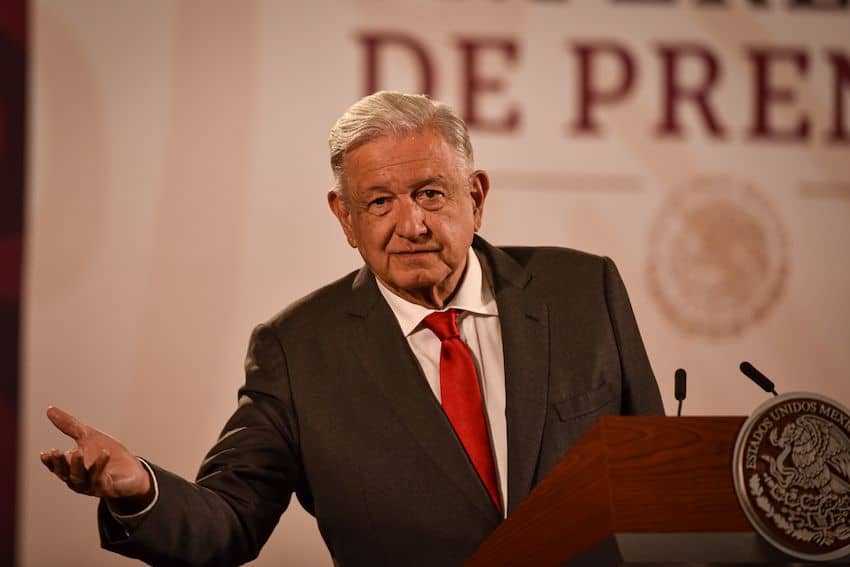
López Obrador noted that the expropriation of land for the construction of the Mexico City-Puebla highway dates back “decades,” and acknowledged that the people currently protesting have maintained that they weren’t compensated, or adequately compensated, by past governments.
“We decided to serve justice and pay them for the damage caused during previous governments. But in order to make amends, we have to do an appraisal — there is a federal government authority that does these appraisals,” he said.
“The appraisals are done, we have the money to pay the campesinos but the lawyers say: ‘we don’t agree with the appraisals.’ They want more,” López Obrador said.
“[But] we, as public servants, can’t pay more than an appraisal establishes,” he said.
López Obrador said he wasn’t aware how much compensation lawyers were seeking for their clients, but claimed they are attempting to take the government for a ride.
The president — who frequently defends people’s right to protest — appeared to rule out any possibility of federal authorities using force to clear the highway.
“We don’t repress because it’s better to convince, persuade [people] than repress,” he said.
“I call on the campesinos to not let themselves be manipulated by these lawyers. … We can’t be held hostage by those who seek to profit. … We’re willing to pay them in accordance with the appraisal,” López Obrador said.
It was unclear when the two sides might come to a mutually acceptable agreement.
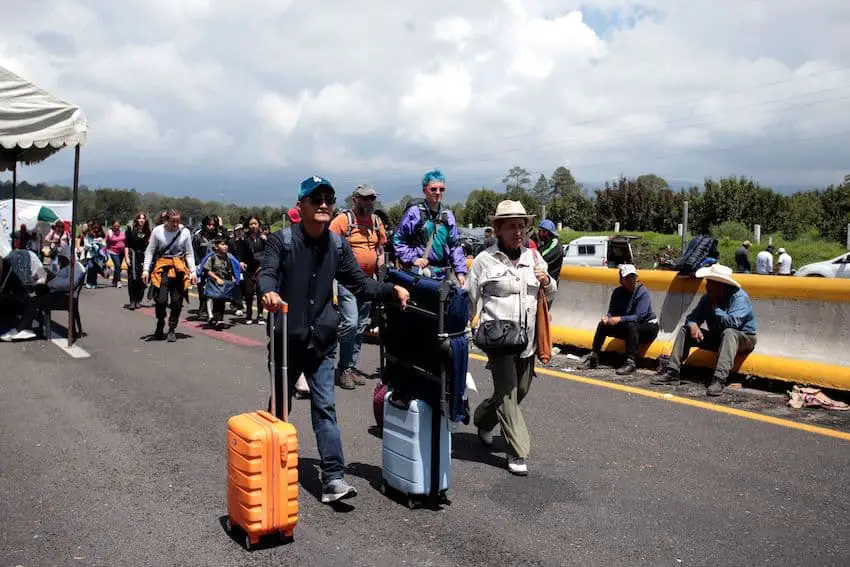
Protesters who spoke to Reforma blamed officials from the Infrastructure, Communications and Transport Ministry and the Interior Ministry for hindering negotiations.
“And they don’t inform their boss, the president, well,” said one ejidatario.
“They give him bad information. We respect the president, but he’s misinformed,” he said.
Truckers and motorists endure cold and hunger
The news station Foro TV reported Thursday that some truckers and motorists had been stranded on the Mexico City-Puebla highway for 46 hours. The cold in the early morning was described as “unbearable” by a reporter.
“They didn’t come prepared at all,” the reporter said. “They don’t have blankets, they didn’t bring food, they didn’t bring provisions.”
Vendors often appear on Mexican highways when motorists face long delays, but some of those stranded in recent days reportedly ran out of money. Some passengers — and even drivers — abandoned the vehicles they were traveling in. The drivers presumably returned to their vehicles once traffic began to move with the opening of single lanes on Thursday.
The protesters also endured cold conditions, but they arrived prepared with tents, blankets and food.
On Friday morning, some heated coffee and warmed tortillas over a fire on the side of the highway as they prepared for another day in the fight for the money they say they are owed.
With reports from Milenio, Reforma, El Economista and El Financiero
